Walter Moseley Hamer 1905-1997
A memoir by his daughter, Nina Hamer
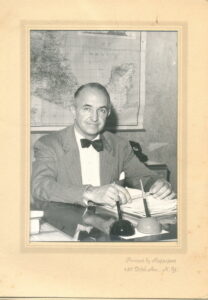
Walter’s parents were Eleanor Turnbull, a third-generation Brit born outside Britain, whose family history in Mexico is very interesting, and Geofrrey Holt Hamer, one of the younger children of Job Hamer Higginbottom. Geoffrey was born in Helensberg, Scotland, but was actually from Rochdale, near Manchester. He came to Mexico when he was about seventeen or eighteen (I think) to join his father after the death of Job’s wife (who was probably worn out from having eleven children) and his older siblings who had been brought over one by one. Job had set up a linen mill in Mexico City (La Linera) with his oldest son, Thurston, who actually came to Mexico first, and was sufficiently impressed to suggest that the family move to Mexico and set up a business there.
In Puebla, Geoffrey met Eleanor and they married. They must have been most compatible, because the marriage was a complete success. They loved each other dearly until death did them part, in spite of the fact that they were never wealthy (I assume because Geoffrey developed extremely bad eyesight, which probably prevented him from holding down a good job).
They had five children, of which Walter was the first, born October 4, 1905, five days before Job’s death.
My grandmother Eleanor told me that she was not a disciplinarian and more or less allowed her children to do as they pleased. I am supposing the household atmosphere must have been most congenial, because all five grew up happily and were extremely fond of each other and of their parents. I also assume that the examples set by Walter’s parents were based on the most desirable British values, because there have been times in my life when I have considered that my father was conducting himself a little too morally and ethically in the circumstances. However, those values never wavered. His convictions were ironclad, no matter what country we were in or who he was dealing with (the President of the nation or the lottery seller in the street).
He was amazingly lucky in that he inherited super genes of all kinds:
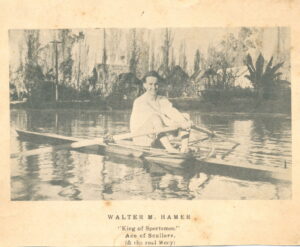
- Health – I don’t remember him being sick day in his life until he was way into old age.
- Physical strength and dexterity – He was unvanquished champion sculler of Mexico for eight years running, and was skilled in golf, tennis and riding (all sports came easily to him) right up to old age.
- IQ – Intelligence – World War I prevented him from going to school in England, so he and his brother Reggie were sent off to the San Antonio Military Academy in Texas for their secondary education, which apparently was all the family could afford at the time. Reggie, who was a bona fide genius and gifted in every way imaginable was a year ahead of him, although a year younger …. not that my father was slow …. rather Reggie was a lucky freak of nature …. the perfect man …. in fact, a kind of Superman, which my father often proudly boasted about …. but, for some reason (possibly the fact that their father Geoffrey could no longer work or possibly something to do with the Mexican Revolution raging at that time) their studies were cut short and they were forced to return to Mexico after a couple of years, which meant my father never graduated from high school.
- Personality – He had charm galore, and was admired and loved by women, men, children and animals of all sorts. It came quite naturally to him to treat everyone exactly the same. He and two of his brothers (Reggie and Herbert) were hired by the United Fruit Company for their ability to manage vast numbers of Latin American employees and workers, which they did brilliantly, with Reggie rising meteorically to the top, closely followed by Walter, all based on a combination of common sense, honesty, total trustworthiness and charm (more later). The position held later by my father required very high intelligence (both IQ and emotional) among other virtues, which he had in abundance.
- Decency – Infallibly honest and decent, regardless of the circumstances (more later).
- Good looks – Reggie, aside from being the genius of the family, had the movie star looks, but my father was anything but ugly. See photos.
- Talent – Every women who ever danced with my father thought he was a simply dreamy dancer, and I’ve been told that by complete strangers when they discovered that I was his daughter …. He had a beautiful baritone singing voice that came naturally. He sang in Church of England choirs in Mexico City and San Jose and played the guitar passably well.
- Breeding – My father was not only noble, but classy with all and sundry, with a complete absence of affectation, as were all his siblings.
Some of those traits would be typically Hamer and others typically Turnbull. It may be thought that many stem from the environment, i.e., what he was exposed to growing up, rather than from heredity. Either way, he had them all in abundance, regardless of where they originated, and so did his siblings (although Reggie and Walter were the stars of the family).
Extraneous information for those who believe in the Zodiac – Walter was a Libra, and demonstrated many of the traits attributed to that sign, particularly balance and harmony. “The iron fist in the velvet glove” is an excellent mini description of Libras, but in his case, the velvet glove was so soft and beguiling that you never realized you were being governed by an iron fist.
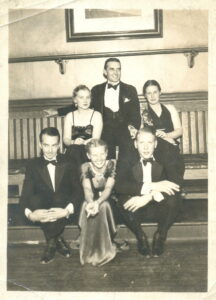
When Walter and Reggie returned from San Antonio, the Linera established by Job and his sons had long since gone bust (there was no longer any hemp or any Porfirio Diaz), so there was no family business for Walter and his brothers to go into. I’m not sure what Reggie did, but my father took a course in public accounting, which was the shortest professional degree available then, so that he could go to work as soon as possible. He then was hired by the Mexico City branch of the Bank of Montréal, and the next few years were great fun, regardless of the shortage of cash. My grandmother decided to rent a few rooms in her house to make ends meet, and they were readily taken by Canadian friends of my father’s from the bank of Montreal. The whole family had a very active social life with those young men and with friends in the Anglo community they had known all their lives, aside from which, my father had time to do his rowing at the British Boating Club in Xochimilco, where they competed against teams from the Italian and German boating clubs. As mentioned, he was sculling champion of Mexico for eight years running, and would have continued winning if the bank hadn’t seconded him to Montréal, where he was soon rowing with the Lachine Boating Club and making new friends. He took a number of banking courses while in Canada, although he was soon to drop banking permanently. In Montréal he met my mother, who was going to McGill and was staying at the house of an aunt on the Lachine River. She took him to meet her family, who thought he was the cat’s pajamas. I guess that was about 1933.
By then my grandmother Eleanor Turnbull’s brother, Walter Turnbull, for whom my father was named, had joined the United Fruit Company, which had vast landholdings and operations in Central and South America and the Caribbean. He was enjoying great success due to a combination of virtues just like those described for my father and his siblings as concerns dealing with Latin Americans on a social and business level, given his background in Spanish-speaking Mexico and his English-speaking upbringing and culture, whereas most Americans lacked such qualities and were usually resented in Latin America.
The company then asked Walter Trumbull if he had any more like him in his family, which is when he roped in his nephews Reggie, Walter and Herbert (I assume Charlie was sick by then … he later died of leukemia), and William (Bill) Turnbull. Walter Turnbull never had kids of his own. He and his wife adopted two children later in life. He was Vice President in charge of Latin American operations, based in La Lima (San Pedro Sula), Honduras.
Walter Hamer was first assigned to La Lima, Reggie to one of the company developments in Colombia, and Herbert to another in Panama. My sister Nancy was born in La Lima (I had already been born in Mexico City, and my brother, Reginald Stuart Hamer, in Smiths Falls, Ontario, Canada, while my father was still with the bank of Montréal).
About a year after Nancy’s birth, we were transferred to Santiago de Los Caballeros in the Dominican Republic. My father never talked to us about his work or his finances, but I know there were no company operations anywhere in the region, so I have no idea what he did there. Maybe buying land for the company. We were there from 1941 to 1946, when World War II was raging.
He may also have been involved in some kind of British intelligence service, because on one occasion, I remember seeing rows of wounded British sailors lined up on the floor of our very large veranda where we lived out in the country. They had been picked up from lifeboats close to the northern coastline after their ship had been sunk by a German submarine. That was all we were told. The next day, the sailors had been taken off somewhere else, perhaps in secret, as Trujillo, the Dominican dictator, was, as dictators usually were, enthusiastically pro-Axis.
From the Dominican Republic my father was sent to Kingston, Jamaica, where I also saw no sign of United Fruit Company operations, so it’s anyone’s guess what he did there, but after a year, he was posted as manager of a Fruit Company division in Guatemala by the name of Bananera, very tropical but nice for us kids …. lots of green areas etc., near the Caribbean port of Puerto Barrios.
While we were there, my uncle Reggie, who was the general manager of all the divisions in Costa Rica, was killed in a commercial plane accident. Although the company provided him with a plane and two American pilots so he could move around quickly to the different divisions, as luck would have it, that plane was in Miami for maintenance on that particular day, so he was forced to take a commercial flight, which killed him. My father was then put in Reggie’s job and we moved to Costa Rica, inheriting his house, his car, his servants, etc. etc. etc.
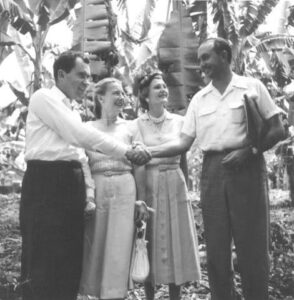
We lived not in a Fruit Company division camp, but in San Jose in the Highlands of Costa Rica with its delightful climate and lovely people, both local and ex-pats. We were there for eleven years. My father had to negotiate labor contracts with the Costa Rican government, which was where his diplomatic talents became more indispensable than ever. There was also a lot of entertaining done at the beautiful big house built for us by the Fruit Company on the outskirts of the city, a lot of golf at the Country Club, summer holidays spent at the seaside in the Limon division, where we had the manager’s house because my father was also manager of that division, trips to the Quepos and Golfito divisions on the company plane (a spacious DC-4) and yearly trips to New York aboard one of the company’s many Great White Fleet ships taking bananas to northern markets. They had six passenger cabins and felt like huge private yachts because they were refrigerated, painted white and had wooden decks to make sure the bananas did not ripen on the way north.
My siblings and I were sent to boarding school in Canada, I when I was twelve. I later discovered that Mades Hamer, who married Kenneth Bannister, had gone to that school (Havergal College) and her daughter, Miryam, thinks she was Head Girl. Miryam and her sister Mary later went there too, although we didn’t know each other then, since they lived in Mexico and we lived in Costa Rica, although I assume there was some communication between our respective parents.
It was all great fun. But after so many yearswith the company and such heady success, my father evidently became privy to some information that led him to decide to accept another job in Ecuador, as head of an American Consortium consisting basically of the nation’s principal (or only) brewery and only cement factory, among other significant ventures. This was never explained to me, but I believe it may have been due to the fact that the Costa Rican government had already taken over all the Fruit Company’s schools and hospitals, and was preparing to expropriate all its land and infrastructure, such as railways, harbor works, and real estate, including three full-sized camps or settlements built by the company on previously uninhabited land and requiring the construction of comfortable homes set in spacious gardens for the administrative personnel, golf courses, swimming pools, clubhouses, commissaries, clinics, hospitals, water treatment plants, landing strips for the company planes, workshops, schools, barbershops, drugstores etc., as well as all the housing and services required by the thousands of laborers working on the banana plantations.
The venture in Ecuador was not a huge success. The Ecuadorian Corporation, as it was called, was controlled by the two men who had set it up initially, Norton and Yoder. Norton had retired in the United States, leaving Yoder to run the business, but Yoder was by then an old man, which is why they were looking for somebody to take over his duties, and decided on my father. Ironically, all my father’s outstanding qualifications did him in. Everyone he worked with liked him so much, and he was so successful and admired, that the old man had a fit of jealousy when everybody stopped kowtowing to him, and relations became problematic. My father saw no possibility of patching things up, and true to form, decided to simply withdraw. So he resigned, packed up and took his family back to Mexico. He was approximately 62 at that point. When I inquired as to the amount of his severance pay from the Ecuadorian Corporation, I was informed that none had been paid. And when I asked if my father was planning to sue the company, I was informed that suing people was very tacky.
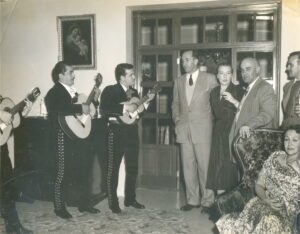
My parents were very happy to be back in Mexico after all that time, and very soon he was approached by a Texan company by the name of The Cameron Ironworks, purely on the basis of his reputation, for a job as head of their Mexican branch, which sold blowout preventers to the Mexican government oil monopoly, Pemex. They lived in the Polanco section of Mexico City for several years, until my father retired and they moved to their new retirement home in Cuernavaca where they spent many happy years socializing with members of the Anglo-American community there, playing golf and looking up old friends from the bank of Montréal days.
I must mention one occasion on the 4th of July one year, when there was the yearly celebration and cookout at the church guild-house attended by about 150 or 200 members of the English-speaking community. There was to be a speech, and a flag-raising and someone was to sing the Star Spangled Banner. But apparently they could find no one with a good enough voice to do the singing, so they asked my father to do it at the last minute (he was known for his lovely voice singing in the church choir), so he stood up, all six foot two of him, and I was most amused to hear the American national anthem celebrating independence from Britain happily sung by a Brit that day!
When my father was about 85, my sister decided that he and my mother should move in with her and her husband, where she fitted out a nice little apartment for them on the top floor (which was street level, as the house was built on a slope) with a lovely view of the forest, where all their needs would be taken care of with a minimum of fuss. I lived next door, and visited them regularly.
My father had a knee operation before the move, and then later an operation as a result of an attack of diverticulitis, but was active and had full cognitive abilities to the very end. He died in his sleep at the age of 92 with absolutely no fuss or bother. I trust he is having a good time playing golf and having drinks with his old friends up in Heaven.
Nina Hamer, June 2021